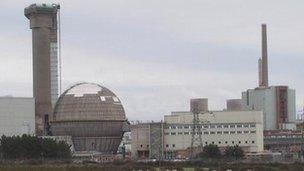Nuclear power: UK will get help to compete, say ministers
- Published

The government has promised to help UK businesses "compete" more effectively in the global nuclear energy market.
Ministers have promised £18m to 35 research projects and £15m for a "world-class" central resource for firms developing technology.
It is estimated the UK's nuclear build programme could create 30,000 jobs.
All but one of the country's 16 reactors - supplying almost a fifth of the UK's power - are set to close by 2023, with replacements planned.
Business Secretary Vince Cable and Energy Secretary Ed Davey jointly launched the Nuclear Industrial Strategy, promising to help "UK compete in the £1 trillion global nuclear industry" by tackling skills shortages.
It covers building, waste management, decommissioning, operations and maintenance.
'Successful'
Mr Cable said: "Nuclear power has the potential to play an increasing role in meeting the UK's future energy needs. It is a source of low-carbon energy and can contribute to the UK's energy mix and security of supply longer-term.
"This strategy - like those for offshore wind and oil and gas - will achieve a more effective alignment and integration of energy and industrial policy to enable the UK to deliver competitive energy technologies in future, with significant input from UK-based industry."
He also said: "Part of industrial strategy is about supporting successful sectors. Today's nuclear strategy is one of several sector strategies we will be developing between now and the summer in partnership with industry.
"And this is one of three that focuses on energy industries: the others being offshore wind and oil and gas."
Ministers say £930bn will be invested globally in building reactors over the next 20 years, with £250bn being spent on decommissioning disused stations.
The strategy will be overseen by a Nuclear Industry Council, co-chaired by ministers and industry.
In 2011 the government announced that new reactors could be built on land adjacent to old sites at Bradwell, Essex; Hartlepool; Heysham, Lancashire; Hinkley Point, Somerset; Oldbury, Gloucestershire; Sellafield, Cumbria; Sizewell, Suffolk; and Wylfa, Anglesey.
Planning permission was granted last week for the Hinkley Point station, the first such facility to be built in the UK since 1995.
But in February, Centrica, which owns British Gas, withdrew from the UK's nuclear re-building programme because of increasing costs and delays.
There have been questions about the financial viability of new nuclear power plants as a result of the coalition agreement pledge to only allow them "provided they receive no public subsidy".
Instead the government is set to fix the future price of new nuclear electricity, to give investors the certainty of a future income stream.
The global future of nuclear as a power source was also called into question after the disaster which occurred in March 2011 when a Japanese earthquake and tsunami rocked the reactors at Fukushima, leaving radioactivity leaking from the plant.
- Published19 March 2013
- Published4 March 2013
- Published29 November 2012
- Published4 February 2013
- Published7 February 2013
- Published23 June 2011
- Published4 February 2013
- Published30 October 2012